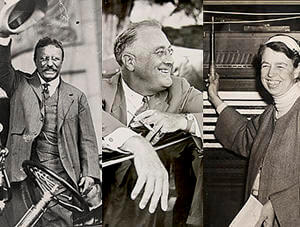 Sitting chained to the TV for two hours a night for a week can shrink the brain until it is bouncing around in your skull like a walnut—unless you are digesting a Ken Burns historical series like the just completed The Roosevelts—An Intimate Portrait.
Sitting chained to the TV for two hours a night for a week can shrink the brain until it is bouncing around in your skull like a walnut—unless you are digesting a Ken Burns historical series like the just completed The Roosevelts—An Intimate Portrait.
The series focused on Teddy, Franklin, and Eleanor Roosevelt. Watching the PBS production, you had to be awed at how these cousins changed the whole trajectory of American history. At the same time you learned how flawed each was. They may have been giants, but they were human like us.
The amazing Teddy used his “Bully Pulpit” to go after the heartless moguls growing fat on the labor of men, women, and children working 16-hour days in the mines and factories of America. We don’t usually think of Republicans as the champions of labor, but that certainly what Republican Teddy was, although the string pullers of the party were aghast.
Franklin Delano Roosevelt probably saved democracy and capitalism in the United States during the Great Depression, although the common wisdom among Conservatives was and is that he started the nation on the path to socialistic ruin. That issue continues to be fiercely debated even today, although nowadays only a politician with a death wish would propose terminating Social Security or Unemployment Insurance. The federal government suddenly became the Big Daddy whose role was that of guarantor of prosperity and happiness.
Eleanor Roosevelt, who lived for 17 years after FDR’s death in 1945, emerged from his shadow and cut a wide swath in the Democratic Party into the Sixties. Among other causes, she championed the civil rights cause of black people, still trapped in the evils of the Jim Crow system in the South. As a young man I recall how hated she was for her liberal views, especially in her quest for racial justice.
The “intimate” aspect of the series certainly humanized these monuments of American history. Maybe it’s a man thing, but I could not help but be awed by how “tough” Teddy Roosevelt was. In the middle of a speech, he took an assassin’s bullet in the chest but kept speaking for another hour. He loved roughing it and almost lost his life in the jungles of South America. He cherished the “glory” of war, but it brought out a side of him that was chilling. He was so proud of the heavy casualties his Rough Riders took in the charge up San Juan Hill. His casual description of killing a man in that battle is less than edifying. In politics, after seeking the support of black leaders, he turned his back on them.
FDR was not exactly the model family man. The demands of his ambitions subverted his devotion to his children, most of whom had lifelong difficulties partly traceable to his absence. Eleanor, so often reminded by her narcissistic mother that she was an ugly duckling, was never able to give her children the nurturing they so needed. For any number of reasons, FDR developed questionable friendships with a number of adoring women, which he hid from his wife. She was not able to provide Franklin with the unstinting admiration that he apparently required and sought in other relationships. Sadly, one of those women was present with him when he died in Warm Springs, Georgia, in early 1945 just as the war was coming to an end. Eleanor refused to fade into obscurity, battling on for the cause she espoused.
In recounting these peccadilloes, Ken Burns is not tearing down his subjects; he is merely reminding us that they were human, and that, while they achieved greatness, they suffered from the same flaws as the rest of us. Eleanor, so hurt by her husband’s infidelity, liked to say, we all have our good and bad sides, and we can only be what we are. (How sad and, I believe, how untrue).
But the saddest thought I was left with was how wrong FDR was in seeing a rising arc of progress in human and international relations. The New Deal and World War II had a profound effect on the land and lifted so many people out of the Depression and into middle class prosperity. It was just the beginning. On top of the nation’s bright unstoppable progress, he and Eleanor foresaw a brighter and safer world. The United Nations would be a guarantee that at last war would be outdated and outlawed.
They were true Progressives, believing that the arc of progress was carrying all of us upward. They forgot that an arc also turns downward at some point. Science and economics may advance, but not apparently human nature. Witness the Korean, Vietnam, Iraq, and Afghanistan wars. And of course today there is ISIS and its primitive savagery. Don’t forget nuclear wannabes like North Korea and Iran, as well as Vlad Putin and his nibbling at NATO’s edges after taking big bite out of Ukraine. Why does mankind love war so?
Peggy Noonan talked to a man who said it’s enough to make you believe something is wrong with human nature. As she put it, that’s a good definition of Original Sin.
